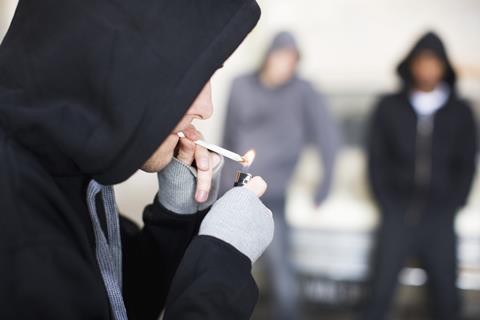
It’s hard to remember a time when the threat to convenience retailers by the illicit tobacco and vaping trade was bigger than it is today. While smoking rates remain in the steady decline they have been in for years, the category is still crucial for many independents, making up 21.9% of convenience sales.
But the rising cost of living is continuing to push tobacco smokers aways from legitimate stores and towards illicit sources. Eighty per cent of smokers bought tobacco in the past year that was not subject to UK tax – a 6% increase since 2022. Meanwhile, a third of smokers are still buying branded tobacco at least once a week, even though the sale of branded packs was banned in 2016.
There’s little evidence that any of the legislation introduced in the past decade to curb the sale of tobacco products has been effective in spurring on the already declining habit. There is, however, plenty of evidence that it has been a huge benefit to illicit traders. The illicit tobacco trade is now a £2.8bn gap for HMRC, up £800m from 2020 figures.
Now, two more pieces of legislation are waiting in the wings and could be the spark that ignites the illicit trade in a way that HMRC will never be able to fully contain. The Tobacco and Vapes Bill will ensure anyone born on or after 1 January 2009 is unable to ever legally purchase tobacco products. Meanwhile, a ban on disposable vaping products will outlaw the largest segment of the vaping market overnight, upending a habit that, for many, is the reason why they were able to move away from smoking in the first place.
Alongside the rising cost of living which, coupled with repeated tobacco tax hikes, has prompted two thirds of smokers to change where they buy tobacco from, the future looks tough for legitimate tobacco and vaping products traders.
Rupert Lewis, director of the Tobacco Manufactures Association, says: “The illegal tobacco market in the UK has now reached an inflection point. Repeated increases in tobacco taxes and ongoing cost-of-living pressures are changing consumer behaviour and driving more smokers to buy illegal tobacco through criminal channels. This is especially alarming, given the Government’s intention to introduce a ‘phased generational ban’ on the purchase of all tobacco from 1 January 2027.
“I believe that there will be profound and far-reaching repercussions for consumers, retailers, law enforcement agencies and communities across the UK if a phased generational ban becomes law. In time, it will push the entire UK tobacco market underground.”
What the phased generational smoking ban means for you
Earlier this year, Prime Minister Rishi Sunak announced that anyone born on or after 1 January 2009 will be unable to ever legally purchase tobacco products. His subsequent announcement of an election on 4 July has thrown the timeline into doubt as the Tobacco and Vapes bill is not among the bills that was rushed through before parliament closed. However, it is unlikely to be dropped completely whichever party is in power after the election. Labour has committed to picking it up should the party find itself in office on 5 July.
Will the law create what TMA’s Rupert Lewis calls an “underground tobacco market” that represents a payday for illicit traders? We don’t know. The ban was inspired by a similar law in New Zealand, announced by left-wing prime minister Jacinda Ardern in 2022, but that was repealed under the right-wing government that came to power the following year. No country has put the theory into practice.
Retailers understand both the threat and the opportunity. “We agree with some parts of the Tobacco & Vapes Bill but not others,” says Scott Graham, owner of McLeish in Inverness. “The generational ban is a good thing because it means people will be forced to switch to alternatives. However, it will increase the illicit trade and there are no effective controls in place to prevent people from buying products on the black market.”
“The bill with undoubtedly increase the illicit trade,” agrees Imtiyaz Mamode of Wych Lane Premier in Gosport, Hampshire. “I know of a store that has received a couple of fines for illicit trading, but it doesn’t deter them from doing it again.”
Sarah Connor, JTI communications director, said: “Over two-thirds (67%) of retailers surveyed told us that they believe the generational tobacco ban would likely lead to an increase in illicit tobacco activity.[5]
“Illicit trade is already rife across the UK, bringing criminals to our local communities and there is concern within the industry that illegal products will become more prevalent through this proposed ban. On top of this, 66% of retailers also stated that they believe the Government does not have the required funding or resources to police a generational ban.”
Preparing for the disposables ban
A far more immediate threat to retailers is the ban on disposables. Government sources cite that this legislation is still due to come in as early as April 2025, but with an election looming this ban hangs in the balance. Like the generational smoking ban, it’s likely there will not be much appetite for any government to drop this completely, so retailers should already be considering what this means for their business.
We’re noticing shoppers switching to refillable pods already and the margins are similar to disposable vapes,” says Mamode. “We’re doing what we can to encourage that behaviour and report illicit trading where we see it while educating our staff to engage. For example, we’ve had customers come in and ask for 1,200+ puff products, which are illegal, and we tell them we can legally only sell 600 puffs. So many are unaware of the law around vapes and they either choose to buy from us or go elsewhere – all we can do is try and educate them.”
More than 1.56 million illegal vapes were confiscated by 152 surveyed councils last year, according to an FOI request carried out by Vape Club. Just 5% of the sellers were issued fines or penalties, with the average fine a measly £2,019.
Retailers should remain vigilant that they are not unwittingly selling illicit stock themselves. Make sure your stock does not contain nicotine or nicotine salt e-liquid that is over 2% (20mg/ml) or contains more than 2ml of liquid. All your products should have the wording: “This product contains nicotine which is a highly addictive substance” displayed on pack.
Research by the ACS has found 24% of consumers plan to use disposables even after the ban is introduced.[6] Considering the only way to access these products will be from illicit sources, that would see a £645m loss to the convenience sector.
ACS chief executive James Lowman said: “Banning something does not mean it ceases to exist. If the Government were really committed to stopping children getting their hands on disposable vapes, then they would focus on cracking down on the illicit trade and enforcing the laws that already exist to prevent children from accessing these products.”
While stores in England that fall foul of the regulations face a £200 fine, reduced to £100 if paid within 28 days, retailers in Scotland face even tougher sanctions. Scottish retailers could receive a fine between £5,000 and £10,000.
Ed Heaver, co-founder and CEO of Serve Legal, said: “We commissioned a survey to our auditors, of largely young adults, to gather their opinions on the trade. The results indicated a heavy dose of scepticism regarding the efficacy of these efforts.
“73% of them believed that illicit trade in the form of proxy sales would increase because of the ban. Over half of the respondents (55%) said that they do not believe these efforts will dissuade young individuals from taking up vaping.”
A challenging future for tobacco and vape retailers
Retailers and manufactures understand the legal UK tobacco market may be over within our lifetimes. The combination of changing consumer behaviour and legislation is only pointing one way. “During PMI’s end-of-year 2023 financial results, our CEO revealed that IQOS had surpassed Marlboro in global net revenues, becoming the company’s number-one international nicotine brand,” says John Rennie, director of commercial operations at Philip Morris Limited. For what was once the bestselling tobacco brand globally, this is a very real sign of where the market is going.
But for the time being, tobacco remains a key footfall driver to independents, while disposables represent one of the biggest profit opportunities to come to convenience stores in decades. An illicit trade that harms local stores while putting consumers at risk will only be spurred on by heavy-handed regulation.
Retailers should remain vigilant of illicit trading in their area and report any evidence to Trading Standards, as well as trade initiatives such as Imperial’s ‘Suspect it? Report it!’
By keeping an eye out for unscrupulous sellers in your area, we can continue to stamp out illicit trade and protect our communities.






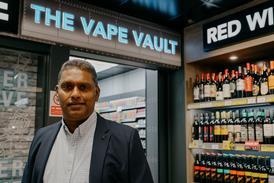








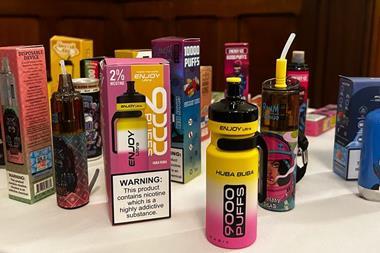
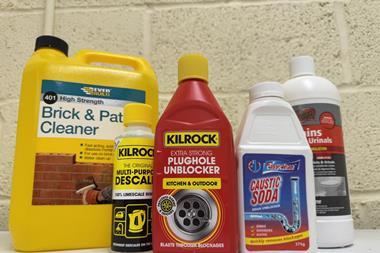
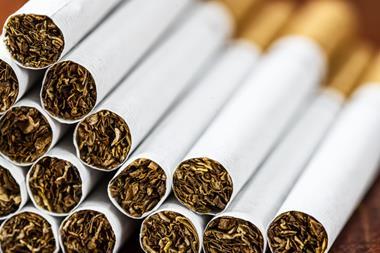
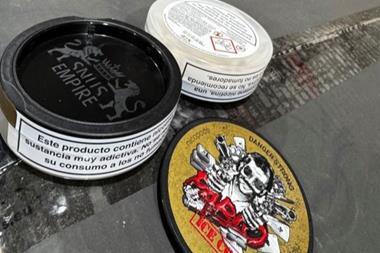

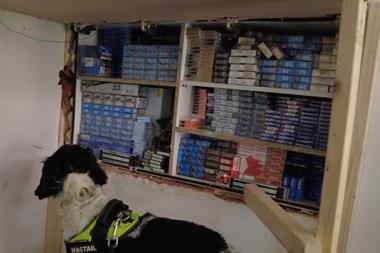






1 Readers' comment